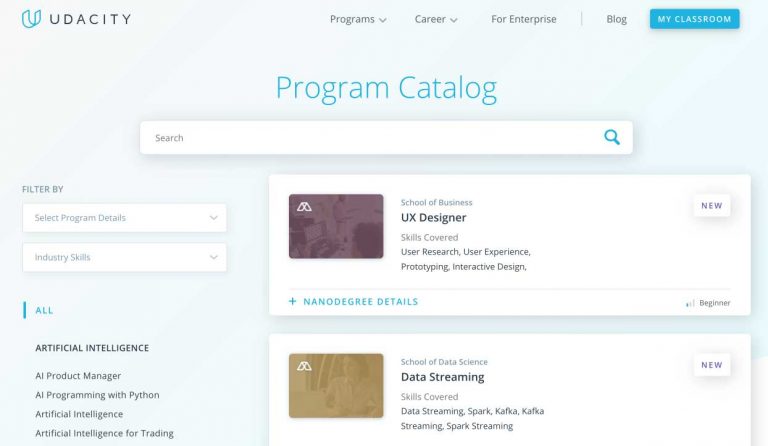How To Start An Online Business
If you are interested in working for yourself and being your own boss, one of the most accessible ways to earn a living involves starting and operating an online business. I’m going to walk you through some of the details of jumping into the world of being the proud owner of your very own internet business, and I will explain some of the most logical and popular options for starting your own online business.
Why Start an Internet Business?
I started my first internet businesses, OuterSports.com and RobbinsSports.com, while I was in college. I was studying electrical engineering at BYU while working as a software developer for a startup technology company.
I decided to start my first online business because of the opportunities I saw that it could provide. Over the years I’d been employed at various jobs, I had observed that, although there are chances to gradually (over periods of months or years) advance in position and pay grade, the promotion process normally took too long, was often unpredictable, and depended too much on someone else’s assessment of my value as an employee.
Owning an internet business gave me much more power to control my schedule. It gave me much more earning power without having to waste time pursuing degrees and certificates. Starting and growing an online business also fit much better with my personality. I tend to like having immediate and direct accountability for how I spend my time. When I put in hours and worked efficiently, I made more money. If I slacked off, my business’ growth would be directly affected.
Here are some of the most attractive reasons it makes sense to start your own online business:
- Very low overhead compared to other business types; all you need in most cases is computer and an internet connection
- High degree of personal accountability for your productivity; no watching the clock
- Make what you’re worth, which can be much more than at a 9-5 job.
- You set your own schedule, although there are many times when
- Live wherever you want; I’ve operated my businesses from places like an RV and while living in Costa Rica
- Build your business at the pace you want: keep your job if you want until your online business produces enough income for you
The terms “online business” or “internet business” can mean many different things. For most of my career, my online businesses have consisted of ecommerce stores from which I drop-shipped products purchased from wholesale suppliers to retail customers who I attracted to my store through search engine optimization and social media marketing. More recently, I’ve ventured into selling products on Amazon, where I’ve created a business netting almost $2M in sales revenue annually using a much different approach than I used to attract traffic from Google and from social media websites like Facebook, Pinterest, and Twitter.
This website itself (Prosperopedia) is yet another version of an online business. The business model involves a lot of blogging and writing and publishing informational content to attract visitors (like yourself), thousands each day. I monetize this website using various channels that include affiliates, selling ad space, and developing and selling my own informational products and how-tos.
Which Form of Online Business Should You Choose?
The specific type of online business you’re going to use to achieve your financial and lifestyle goals is your choice. There are thousands of different possibilities, many of which can be equally lucrative.
The simplified way I tend to characterize the essence of internet business is like this: If you learn to data around on the internet in a useful and productive way, you can make a great income by take advantage (in a good way) of the huge audience that is connected to the worldwide web.
I will describe some of the most common ways to make money with an online business. There are some
Ecommerce Store
This has been my staple business. I’ve built several ecommerce stores over the past 20 years, selling products that range over a wide variety of niches, including:
In all but one of these businesses (vinyl decals), the majority of my products were drop-shipped, meaning that I purchased the products from my supplier AFTER a customer purchased the products from my online store.
You can learn many of the specifics of how I built my ecommerce businesses by going to the Udemy course I created to teach people how to build a drop-shipping business that nets $60k annual income.
To start an ecommerce store, you’ll need to find one or more products to sell. You’ll also need to find a supplier for the products you want to sell unless you’re going to manufacturer them yourself.
In my case, I found wholesalers and distributors who were willing to allow me to purchase their products and sell them at a marked-up price to make a profit. Using this approach removes much of the complicated startup work (which can exhaust a new business owner) out of getting right to your first sale, which is important. From my experience, the shorter the time between when you dive into your new online business and when you get your first order, the more likely it is you’re going to stick with it. Many people I’ve mentored start out spending too much time overthinking their product niche, and never get to the next steps of the building the business.
Whether you decide to sell your own products online or market products from wholesale suppliers, here’s the typical recipe for building an ecommerce store.
- Create your official business entity. This involves registering a business entity in the state where your business is located as well as obtaining a tax id number (EIN) from IRS.org.
- Determine which products you want to sell and set up supplier accounts. If you are creating your own product, you’ll obviously need to find a manufacturer in the United States, or overseas using a directory such as Alibaba.com.
- Register a web domain for your business and build a website with a shopping cart to sell your products. You can go the simpler route and use a hosted platform like BigCommerce or Shopify, or you can build a more custom and sophisticated store using WordPress and WooCommerce. I use the WooCommerce shopping cart with WordPress because of the built-in blogging and content features of WordPress, which are not found with the hosted shopping cart solutions.
- Now it’s time to market the heck out of your products and your store in general. Much of the marketing is actually done while you’re adding your products to your store and creating category pages for them. You need to make sure you understand and follow SEO best practices such as writing descriptive titles and meta descriptions and compelling informative content for each page. Other elements of marketing for your ecommerce store include organic search engine marketing activities such as content writing and publishing, link building, video production, and other activities available for driving web traffic to your store. Moz.com is probably the best learning resource for attracting free search engine traffic to your website. You might also consider taking an online course like the learning digital marketing class on Udemy. There are also lots of free resources on YouTube and elsewhere to learn how to do internet marketing.
Selling Products on Amazon
For more than a decade of my online business career, I ignored Amazon (despite being contacted many times by Amazon account reps) and focused on getting customer traffic from Google and social media websites. In the past few years though, I have experienced the power of selling on Amazon. There are hundreds of millions of people who use Amazon each day, which means you have a captive audience to sell to if you learn how to do Amazon marketing well.
There are several different approaches available for selling on Amazon. Here are the most common ones.
Selling Your Own Products
Selling your own products on Amazon typically involves finding a niche, sourcing quality products locally or from overseas (China is obviously the most popular, and people typically use Alibaba.com to find manufacturers) to fill some of the needs in that niche, and using Amazon to turn over your inventory.
You can either sell your own products on Amazon and do the fulfillment (shipping) yourself, or you can ship your products into Amazon to be sold through their FBA (Fulfillment by Amazon) program. There are advantages and disadvantages to each of these approaches. Fulfillment fees are typically higher with FBA than when you do fulfillment yourself, but the FBA program also offers the convenience and flexibility of being able to focus strictly on your product and letting Amazon deal with shipping, returns, and related logistics issues.
Retail Arbitrage
Retail arbitrage involves finding products already being produced by brands and sold in retail stores. The goal with retail arbitrage on Amazon is to find products at steeply discounted prices (clearance sales are most commonly used) that are selling well on Amazon. You purchase the product, then list it for sale on Amazon. As with selling your own product, you can choose to do the fulfillment yourself, or you can use FBA.
Online Arbitrage
Online arbitrage is very similar to retail arbitrage, except that you don’t have to go physically visit the stores where you’ll be shopping for discounted products. Instead, you buy them online through stores’ clearance sections. There are software programs available to help you find products selling cheaply enough in online stores and that sufficient demand on Amazon that you can turn over the inventory quickly and have solid margins.
Whichever route you choose to go, it is relatively easy to start an Amazon business an see success quickly. I’ve been able to grow my revenue with my Amazon store faster than I have any of the ecommerce stores.
With respect to your organization, to sell on Amazon you don’t necessarily have to set up a business entity. Instead, you can sell as a sole proprietor using your social security number as your tax id. However, it is recommended that you set up a business entity for lots of different reasons, including to limit liability, to reduce your tax obligations, to set up accounts with business entities, and for managing relationships you might have with partners.
Selling on eBay, Etsy, and Other Platforms
Amazon obviously isn’t the only marketplace you could use to build your own store. Many people make their livings selling on eBay, Etsy (for handmade items), and other online commerce platforms. However, it’s been my experience that the efforts you’d spend on an Amazon business will produce much more ROI than eBay, Etsy, and other places you might want to sell.
Blogging and Publishing Content
If one of your favorite things to do is write (or if you’re interested and willing to learn how to be a good writer), and you don’t want the hassle of dealing with customers (many of whom can be spoiled brats who want to game the system, use your product and return it, or otherwise abuse their power as consumers) blogging and content publishing is a good option for you. Prosperopedia.com is built using this business model.
There are countless examples of people who have made themselves wealthy by blogging. One such person with an amazing success story that started from scratch, a woman named Abby Lawson who runs Just a Girl and her Blog, published her income reports up until December 2016. The last three months the income reports were published showed revenues in excess of $40,000 per month.
There’s no reason that couldn’t be your story over the next year or two.
The blog and content version of an internet business is similar to building an ecommerce store, except that instead of being distracted by customers and products, you can focus strictly on creating valuable content – written and visual – that attracts an audience that grows, and that you can ultimately monetize. Prosperopedia.com itself is on pace to his $20,000 in monthly revenue by the end of its first year of existence.
The major steps involved in starting an online business involving blogging and content publishing are these:
- Choose a content niche (Prosperopedia.com’s is all about prosperity, financial wealth, success, and happiness, much of it discussed with a spiritual and religious perspective)
- Register a domain and set up your blog or content site. Most bloggers use the locally installed version of WordPress (in which you download and install their software on your web host), which powers a good portion of websites on the internet. You could also use a publishing tool like Blogger.com or WordPress.com, which tend to be easier to setup than setting up your own domain. Using Blogger.com or WordPress.com has limitations though, and are not normally used by bloggers who
- Make a list of content topics for your site. I’d suggest starting with a list of 20-50 article topics to create a solid foundation, then give yourself some flexibility to pivot as you see how effective those articles turn out to be.
- Write and publish useful articles, how-tos, or whatever you’ve chosen
- Drive traffic to your blog using SEO, social media, and other traffic sources
- Monetize your website by selling ad space, being an affiliate for products and services that relate to your content, or even selling your own
Monetizing Your Content Website
Selling Ad Space
Selling ad space on your website may seem like a difficult process, but it’s actually not. There are several different ways to get advertisers to pay you to put up a banner or a text link to their website. The easiest to implement is Google’s AdSense program.
Google AdSense
To make money on your website using Google AdSense, you start by simply apply for an AdSense account after you’ve got enough content on your site to make it look professional and complete. Once your AdSense account has been approved, you can embed up to three “ad blocks” into whichever page on your website you’d like. Google then inserts ads into your page that fit with the content of that page. When someone clicks on an ad served up by your page, you get paid some amount money (the actual amount per click depends upon several factors, including how much the advertiser is bidding in Google AdWords for each click). You’ve certainly seen AdWords/AdSense ad blocks published on many of the web pages you’ve visited.
I often share this testimony published by Google of a woman in Argentina who built an income to support her family using Google AdSense. She started producing and publishing content for her website, Educacion Inicial while she was laid up in bed during a difficult pregnancy.
In addition to Google AdSense, there are many other automated ad insertion programs available to choose from.
Besides the automated advertisement opportunities that exist, there are thousands of advertisers that are consistently looking for niche websites related to their products and services to whom they’re willing to pay for a monthly fee for exposure.
Affiliate Marketing
Another popular method of monetizing a blog or content website is to become an affiliate for websites that want to promote their products through an affiliate network. Amazon Associates is one of the most used affiliate programs on the internet. There are thousands of affiliate opportunities that can be found through affiliate portals such as Commission Junction or Share-A-Sale.
Ready to Start Your Online Business?
Hopefully your mind is now open to the possibilities that exist for starting an online business. You can be successful building your own business using anyone of these methods.
Feel free to let us know what option you decided to go with and how it’s working out for you once you’ve kicked off your business.







